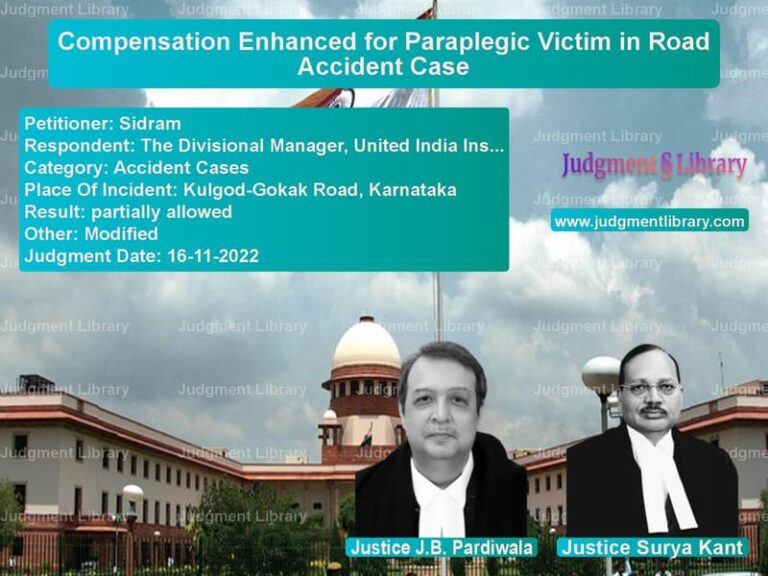Supreme Court Remands Punjab Land Acquisition Case for Revaluation of Compensation
In a significant ruling, the Supreme Court of India, in the case of State of Punjab & Ors. vs. Diwan Chand & Ors., remanded a land acquisition dispute to the Punjab and Haryana High Court for fresh consideration. The judgment underscores the importance of fair compensation in land acquisition matters under the Land Acquisition Act, 1894 and emphasizes the necessity for consistency in judicial decisions regarding compensation assessment.
Background of the Case
The dispute originated when the Punjab government acquired land belonging to Diwan Chand and other landowners for public purposes. The landowners challenged the compensation amount fixed by the Land Acquisition Officer, contending that it was substantially lower than the prevailing market rates.
The case was initially decided by the Punjab and Haryana High Court, which ruled in favor of the landowners and directed enhanced compensation. However, the State of Punjab challenged this decision in the Supreme Court, arguing that the compensation determined by the High Court was excessive and not in line with the legal principles established under the Land Acquisition Act, 1894.
Legal Issues Raised
- Whether the compensation awarded by the High Court was in accordance with the legal framework for determining fair market value.
- Whether the landowners had provided sufficient evidence to justify an increase in compensation.
- Whether the Supreme Court should uphold the High Court’s ruling or remand the case for fresh consideration.
Petitioner’s Arguments (State of Punjab)
The Punjab government, as the petitioner, presented the following arguments:
- The compensation awarded by the High Court was excessively high and deviated from established legal principles.
- The valuation methodology used by the High Court was flawed and required reconsideration.
- The landowners had failed to provide adequate documentary evidence to support their claim for higher compensation.
- Similar land acquisition cases had been remanded to the High Court for fresh evaluation, and this case should be treated consistently with those rulings.
Respondent’s Arguments (Diwan Chand & Ors.)
The landowners contended the following:
- The compensation initially fixed by the Land Acquisition Officer did not reflect the actual market value of the acquired land.
- The High Court had rightly considered contemporary sales transactions in determining the enhanced compensation.
- The government had undervalued the land to reduce the financial burden of acquisition.
- The Supreme Court should uphold the High Court’s ruling rather than remanding the case, as prolonged litigation would further disadvantage the landowners.
Supreme Court’s Observations
The Supreme Court carefully examined the arguments presented by both parties and found that:
“In the nature of the order we propose to pass, it is not necessary to issue notice to the respondents, since the connected matters (Civil Appeal No. 2145 of 2016 & batch) have already been sent back to the High Court by our order dated 11.01.2017.”
The Court emphasized the need for uniformity in judicial decisions and noted:
“Therefore, these appeals are disposed of in terms of the Judgment dated 11.01.2017 passed in the abovementioned batch of appeals.”
The ruling indicated that the Supreme Court sought to maintain judicial consistency and avoid discrepancies in land acquisition compensation cases.
Final Judgment
The Supreme Court ruled in favor of remanding the case back to the Punjab and Haryana High Court, directing that:
- The High Court should reassess the compensation awarded in light of legal precedents and applicable valuation principles.
- The landowners should be given an opportunity to submit additional evidence, if necessary.
- The High Court should consider similar cases that have been remanded to ensure consistency in its judgment.
The Court also clarified that the matter should be disposed of expeditiously to prevent undue hardship to the landowners.
Key Takeaways from the Judgment
- Fair compensation is a critical aspect of land acquisition cases. The Supreme Court emphasized that compensation must be determined based on objective criteria.
- Judicial consistency is essential. The Court sought to ensure that similar cases were adjudicated in a uniform manner.
- High Courts play a crucial role in determining land acquisition compensation. The Punjab and Haryana High Court was entrusted with reevaluating the matter with fresh considerations.
Implications of the Judgment
The ruling has broad implications for future land acquisition cases:
- It reinforces the right of landowners to challenge compensation amounts that they deem inadequate.
- It prevents excessive undervaluation of land by acquisition authorities.
- It establishes that High Courts must thoroughly evaluate compensation claims to ensure fairness.
Conclusion
The Supreme Court’s decision in State of Punjab vs. Diwan Chand highlights the judiciary’s role in ensuring just compensation for landowners in acquisition matters. By remanding the case, the Court ensured that compensation determinations are aligned with legal principles and market realities, thereby safeguarding the rights of landowners.
Don’t miss out on the full details! Download the complete judgment in PDF format below and gain valuable insights instantly!
Download Judgment: State of Punjab vs Diwan Chand & Ors. Supreme Court of India Judgment Dated 10-04-2017.pdf
Direct Downlaod Judgment: Direct downlaod this Judgment
See all petitions in Property Disputes
See all petitions in Damages and Compensation
See all petitions in Landlord-Tenant Disputes
See all petitions in Judgment by Kurian Joseph
See all petitions in Judgment by R. Banumathi
See all petitions in Remanded
See all petitions in Remanded
See all petitions in supreme court of India judgments April 2017
See all petitions in 2017 judgments
See all posts in Civil Cases Category
See all allowed petitions in Civil Cases Category
See all Dismissed petitions in Civil Cases Category
See all partially allowed petitions in Civil Cases Category







